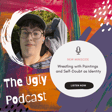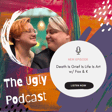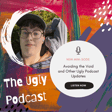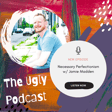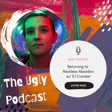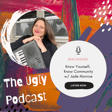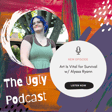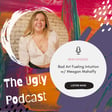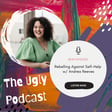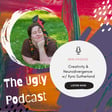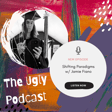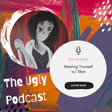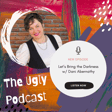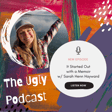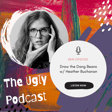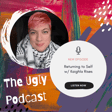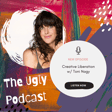Introduction to the Ugly Podcast
00:00:03
Speaker
Welcome to the Ugly Podcast. I'm your host, Lauren Alexander, she, they, and this is the place where creatives are encouraged to make messy, ugly art and let go of perfectionism.
00:00:14
Speaker
I started this podcast with my creative partner, Emerson, and we've since grown into our businesses. And this podcast is now evolving into a space where I interview other creatives to discuss our creative processes and how we navigate the mental mind field of creativity. This podcast serves as a reminder that you and your art get to be whatever the hell you want to be, ugly and all.
00:00:42
Speaker
Hello and welcome back to the Ugly Podcast. I'm really, okay, I say this every time. I say I'm excited to have this guest. I'm excited every time. You guys know by now I'm just excited every time.
Sophie Kanata Bowman on Anti-Perfectionism
00:00:54
Speaker
So my guest today is the anti-perfectionist book editor and writing coach. She is a playwright, theater performer, rock climber and amateur herbalist. Would you please introduce yourself with your first and last name and your pronouns please?
00:01:11
Speaker
Yes, I am Sophie Kanata Bowman. I use she-her pronouns. And yeah, like you said, I'm a book editor and a writing coach, specializing, I guess, in working with authors on moving through perfectionist tendencies so they can find more joy in their writing process. I love it. You're speaking my language, as you know.
00:01:34
Speaker
So what drew you to the name anti-perfectionist editor? And also, was there kind of like some nervousness around proclaiming, like, yeah, you're nodding, proclaiming and harnessing the anti-perfectionism label? Oh, yeah. I knew for a minute that I was like, that I was interested
00:02:02
Speaker
in rejecting perfectionism because I know that it's something that I've struggled with for a long time. More importantly, it's something that I know that a lot of my authors struggle with. I've seen authors show up to our consult calls or our initial calls before we start editing and they're very nervous.
00:02:27
Speaker
And that's totally normal and natural, but I find that so interesting because it makes sense that they're nervous. They're passing their draft off to an editor who the myth is, who is going to tell you all the things that are wrong with your manuscript, all the things you did imperfectly.
00:02:48
Speaker
So I think it makes a lot of sense that authors come to me initially quite nervous because they're about to hear all of the things that went wrong. And I think the first thing that we work on, regardless of what type of editing we're doing, even if it's a proofread, the first thing we work on is unpacking that and taking a breath and
00:03:11
Speaker
I try and remind the author that it's all a process. There is no such thing as perfection. I'm not going to tell you what's wrong. I'm just going to tell you how we can bring out the parts of your story that feel most you.
Embracing Imperfection in Editing
00:03:24
Speaker
So that's something, yeah, I think, but how did I choose the anti-perfectionist editor as a title? I was trained as a proofreader at a publishing house and I learned, well, I thought when I started editing that editing was a practice in perfection. I thought that my job was to find all the mistakes and eradicate them
00:03:52
Speaker
And if something went depressed with a mistake in it, that was the cardinal sin. That was bad. And I think in the publishing world, that is commonly understood as bad. You don't want to send something depressed with a mistake in it. So I really put so much pressure on myself early on.
00:04:16
Speaker
to find everything. And honestly, it made me a worse editor because I was trying to look for everything all the time. And what I learned as I matured as an editor is that you have to layer in each thing that you're looking for. You can't find it all at once. And so you learn how to work with your brain to be most productive. And sometimes that means that if you're doing a copy of it, for instance, you're not proofreading.
00:04:44
Speaker
So it will not be perfect. So I learned that as an editor in my training, and then I noticed that my authors were experiencing their own version of perfection and a perfectionism. And then I was telling them that they didn't need to hold on to that perfectionism, but yet I was still practicing perfectionism in my own editing work. And so I found hypocrisy in that process.
00:05:13
Speaker
And I think the reason it took me so long, at least a couple of years, to really decide that I wanted to be public about the word anti-perfection as an editor, I was afraid that people would see that word and think, oh, so you don't care about finding mistakes in my writing? That's why I'm hiring you. Yes.
00:05:35
Speaker
Yeah. I have that same fear. Right. And so I really hesitated for a while where I thought it would lose me work and clients. But at the end of the day, I really just did some soul searching and I came to the conclusion that I can't be a hypocrite about what I tell my authors I need to lead by example. And that means we are having
00:06:00
Speaker
deeper, more complex conversations about expectations and about perfection. And I am just deciding to trust my authors to have that complicated conversation with me and it's gone well. I love that. Yeah, I think most editors, when we first start out, we all have on our website, I'm going to perfect your writing.
00:06:24
Speaker
We've all written it, we've all said it. But yeah, the longer you do this, the more you realize, oh, perfection is never guaranteed, no matter how many times something has been looked over. And it just like, it wastes so much time to have that belief that what you're working on needs to be perfect. At least like for me, I ended up working on things for so much longer than I needed to, just like,
00:06:53
Speaker
copy editing and more copy editing, reading through, reading through. And I like, no matter how many times I looked at that, I was never going to catch every single thing. And yeah, coming to terms with that, it just, it improves your relationship to writing. It improves your relationship with your clients.
00:07:10
Speaker
And just improves your relationship, at least in my case, with myself, like allowing myself to hold that imperfect space outside of me so that I could love and accept the imperfection that's within me, you know?
Sophie’s Creative Roots and Storytelling
00:07:30
Speaker
And I think it's important also, and I wrote a blog post about this as I announced myself as an anti perfectionist editor. I think an important detail is that it doesn't come at the expense of polished work. It doesn't come at the expense of powerful storytelling. It in fact helps us redirect our energy to focus on the power and the impact of the work. Exactly. Yeah.
00:07:56
Speaker
Amazing. So what was your relationship to creativity like when you were younger? And then when did creativity kind of take center stage? Wink, wink.
00:08:11
Speaker
Yeah, I think like there's kind of maybe two phases to that answer. The first is growing up, there was a lot of creative space in my house every Sunday, depending on the weather. If it was nice outside, my dad and I would go out and ride our bikes. It was not nice outside, which I live in San Francisco, so it was 50-50. It was not nice outside. We would set up a card table.
00:08:40
Speaker
put some newspaper down and do an art project. And it was a different art project all the time. I think one time we made a flip book, another time we'd go out and sketch.
00:08:53
Speaker
And my dad was a very talented artist, so I would always compare my work to his. I got used to not committing to the game of comparison very early on because I was never going to be as good as artistically talented as my dad, but I was also like eight.
00:09:14
Speaker
Yeah, we would do art projects every Sunday. And then sometimes every Friday we would have a movie night, which always had to be a movie that I had never seen before. So I learned a lot about storytelling very early on.
00:09:29
Speaker
by seeing sometimes very challenging, intellectually challenging pieces that we wouldn't really typically show a 10-year-old.
00:09:44
Speaker
Yeah, so storytelling was big in my household and creativity was big and just like making use of whatever crafts we had around was pretty central. And a lot of that came from my dad also just being very interested in art and storytelling and writing.
00:10:01
Speaker
And he's also an editor himself, so I learned, I sort of did a little bit of copycatting as a kid. And I learned from him as a writer, and I think
00:10:17
Speaker
I became very interested in what we can do with language. I became interested in how to break rules. I remember coming back from English classes and being like, teacher told me you can't start a sentence with and. And my dad would be like, you can do whatever you want. Lunchable. And then I would be a little jerk in class and say your teacher. Oh, I'm sure your teachers love you.
00:10:42
Speaker
Oh, yeah. But actually, my dad says he's an editor.
00:10:53
Speaker
You think you're joking. No, I'm dead serious. I got really interested in just playing with words and with sentence structure and with vocabulary very early on, and then that evolved into me writing a lot of short stories.
00:11:14
Speaker
originally about my imaginary dog friends and we started young and then that really just drove a lot of my creativity as a younger kid and then later on I think I started to really combine my love of
00:11:39
Speaker
film from like a lot of these Friday movie nights with my love of writing and so I got into screenwriting and eventually playwriting. So now we're in high school and I'm taking an acting class just for fun. I think I took like a screenwriting course at some point one summer and I'm really starting to like
00:11:59
Speaker
explore this genre or this medium. And when I think this evolved even further in college when I started taking acting classes, not to get good at acting because I thought I wasn't an actor, but because I was
00:12:20
Speaker
learning about playwriting. In my senior year of high school, I wrote my first one-act play and I was lucky enough to get it produced by Youth Theatre Festival in Berkeley. And then I was like, wow, that was really fun. I really learned how my words come out of other people's mouths.
00:12:38
Speaker
And I want to explore that further. I learned that sometimes these things don't come out the way I wrote them in other people's voices, and that's okay. But I wanted to really kind of hone the craft of playwriting. So in college, I was like, okay, well, maybe to be a better playwright, I need to try acting.
00:12:57
Speaker
So I took a few acting classes. The first one was a class on acting the Roman tragedies with the professor eventually became my advisor at my school and we spent so much time learning scansion in
00:13:21
Speaker
What is scansion? Scansion is commonly used in Shakespeare, for actors performing Shakespeare, but it basically means you look at, let's say a monologue, and you go through and you
00:13:43
Speaker
mark out the rhythm of the text. So normally Shakespeare would write a lot in iambic pentameter.
00:13:53
Speaker
heartbeat and scansion is sort of like going through and identifying like is this first of all in iambic pentameter? Is it in regular prose? What does that mean in terms of is this more romantic speech? Is this more rhetorical speech? Oftentimes rhetorical speech was not in iambic for Shakespeare. Romeo and Juliet is heavily in iambic pentameter.
00:14:17
Speaker
So scansion is going through and really understanding the rhythm of the speech and where that rhythm breaks. So when the rest of the monologue is an iambic bantameter, there might be a moment where it breaks the rhythm. And that is not a mistake. We take that as information. And so we learn that
00:14:38
Speaker
if there's a breakage in the rhythm or any other information about punctuation, like the difference between a colon and a period or a comma, all of that is information for the actor. And that's what, that's essentially what scanning a text looks like. So I learned that in my acting class and it taught me a lot about playwriting and writing in general, not just playwriting, but also I could take that back into prose because it really taught me how to
00:15:07
Speaker
how powerful each syllable and word really can be.
Acting's Influence on Writing
00:15:12
Speaker
It taught me how weight distribution in a sentence can shift so easily just with a change in rhythm. So I took that class and I learned a lot about writing, but I also started to get more comfortable with text and I kind of started having fun with acting. So I tried one more acting class called Rehearsing the Play.
00:15:37
Speaker
which was important as a title because it wasn't called acting, it was called rehearsing the play. And this was sort of like this beautiful evolution of like all of this huge writing journey that I had taken up until then, where the first thing that we talked about in class was the professor came up and he was like, okay, so acting is actually really simple.
00:16:04
Speaker
And I was like, no, you're lying. I'm not good at acting. And he's like, no, no, it's it's really simple. It's like, forget about the method. Forget about all these other acting techniques you think you have learned. It's just about vibration. It's about making a mess in the room. Every moment is a rehearsal. There's no such thing as a performance.
00:16:24
Speaker
Um, even performances are rehearsals because in theater, everything is new every night. Even if you're saying, you're saying the same words, you're saying the same lines, but the energy in the room is different based on the audience in the room, your energy levels as a, um, as a cast. Um, and his whole thing was sort of like, it's really easy. Actually, you just listen to what's around you. And the only thing you need to worry about is the people in this room. Hmm.
00:16:55
Speaker
And when you can get comfortable with that, you can start making a huge crazy mess in this room because you don't need to worry about doing it right. You're not performing, you're not learning lines, you're learning thoughts. And it becomes a lot more liberating when you can think of it that way. And then I actually liked acting. And I was still learning. It's like that one teacher to describe it a different way and you're like,
00:17:22
Speaker
Oh, I don't have to do it this way. Great. Then that's way more fun. You just need that one person to tell you that. Absolutely. So yeah, that's kind of like the creative journey from early to late. But yeah, I think like that really taught me a lot about how to liberate my own creative process, how to care less about how it looks and more about how it feels.
00:17:48
Speaker
and how to connect with other people and how creating art, whatever you're doing, acting, writing, playwriting, prose writing is all about creating a vibration between you and your reader or audience member. Yeah, I love that. You've talked so much about how that evolved into your writing life. So how did you shift into editing? Yeah.
00:18:17
Speaker
I think it really came with a job. I got a job as a receptionist at a theater publishing company at a college and the director of the editorial department happened to go to my school and we got chatting.
00:18:40
Speaker
And she asked me if I had ever thought about editing, and I was like, well, I do a lot of writing, and my dad's an editor, so I can edit. And she's like, can you do this sample proofread for me? And I proofread a play. And she's like, cool, do you want to be an editorial?
00:18:55
Speaker
And I was like, absolutely, I do not want to stay at reception. I get your phones all day. So that's how I started editing. And I just learned that I loved it. I learned so much about not just how to find the mistakes, kind of like what we talked about, but also when something isn't a mistake. I learned a lot about intentionality and how to identify
00:19:23
Speaker
where the author might be making this quote mistake on purpose. Yeah. Yeah. That's such a valuable thing for an editor to know because it's so easy to put our own biases and our own thoughts on how something should be into our editing. But yeah, that's so important to be able to identify like, no, the author did this intentionally. I need to leave it alone, even if it's not how I would do it. Yeah, because it's theirs. It's not yours. Yeah, it's theirs. 100%.
Advertisement: Writer's Helm
00:19:57
Speaker
Hey writer, are you feeling adrift in your writing practice? Like the word swept you out to see, but you have no idea where you're going? Climb aboard the writer's helm. I'm Lauren. And I'm Gabby. And we're both writers and professional editors who are here to support you on your writing voyage. With the writer's helm, you get access to group co-writing sessions, Q&A sessions, our private community chat room, and group coaching calls to help you along no matter what stage of the writing process you're in.
00:20:22
Speaker
Members of our crew have said that they've reconnected with their excitement for writing and feel energized from the support they've received from us and each other. You can sign up for the writer's home at any time, which comes with a one-week free trial to make sure that we're the right crew for you. You don't need to navigate these stormy seas alone. Let the writer's home take you to New Shores.
00:20:43
Speaker
Okay, so in preparing for this episode, we wanted to kind of focus on improvisation.
Improvisation in Writing
00:20:52
Speaker
So yeah, tell me just a bit about how improvisation falls into writing, how it falls into just living a creative life. Opening thoughts. I think it comes down to like, I guess if you're thinking about improv as a writer,
00:21:14
Speaker
I think what works most powerfully, I think when I'm writing most powerfully and most truthfully and the writing that I'm most proud of comes when I'm just trying something on, but also when I'm letting a lot in emotionally. And I think improv and writing feels like opening up all the valves
00:21:45
Speaker
Which can be scary because that means it's hard to control what comes in. It can be fear, it can be excitement, it can be love, anger. But if you can sort of safely hone all of this into your writing, it can create such colorful work. And sometimes you just have to
00:22:10
Speaker
I had a blog growing up called The Scrawling Muse, and the whole reason behind that name was I was like, I'm just a scrolling muse. It's a scrolling muse in her obliging hand, and the idea being that you're just like...
00:22:24
Speaker
ascribe to whatever happens in your brain and you just like let you let that unfold and Yeah, I think I think I took that a lot from from acting because acting is also kind of like opening up valves Rehearsing in a room with other people is like I don't know what's gonna happen because I don't control everyone else in this room so I just have to go with the punches and
00:22:54
Speaker
and see what comes my way vibrationally like one of my other acting teachers mentioned she was like acting is kind of like playing the violin if one violin on one side of the room vibrates a violin on the other side of the room will also vibrate
00:23:15
Speaker
And that is also what this is really all about for me is I can't necessarily know the notes that the other violin is going to play, but I have to be ready to accept that vibration. Does that make sense? Yeah, it does.
00:23:31
Speaker
And I think I take a lot of that into my ugly writing practice, those times when I'm just letting everything flow out of me into a very messy nonsense. But it's being willing to just play with whatever shows up instead of trying to control it, which
00:23:52
Speaker
Like when I'm writing, when I'm working on my actual memoir, it's a lot harder for me to do that improvisation, to channel that because I'm wanting to control it and like actually form it into something. But that also makes it a lot more stagnant in some areas and the creativity doesn't flow as often. And so when I get stuck in that mode where I'm trying to form it into something and force it,
00:24:20
Speaker
Um, then I step away and I do my ugly writing exercises, which sometimes they don't end up being ugly at all. Sometimes they're beautiful. And I'm very happy that I did them, but it is, you have to, you have to be willing to open yourself up to that idea that whatever is going to come out of you, like you said, whatever valves you're going to open up, you're going to accept that and let it flow onto the page no matter what it turns out like. Um, yeah.
00:24:49
Speaker
I think it's also worth mentioning, it's all really beautiful to talk about. And I feel so passionately about this practice of sort of accepting things as they come, but it's also really hard. And I think it's important to make space for that because sometimes you're gonna show up and try and let it in and it's just not there and that's okay. And that's sort of part of this.
00:25:18
Speaker
if it doesn't come, that's what happened. And we'll try again tomorrow. But I completely empathize with that. Sometimes I sit down and I think I'm about to write the best thing ever and I'm just not in the mood. And it's like, maybe I'm just a little too emotionally capped out for that day. And sometimes you just have to learn that sometimes you just have to
00:25:49
Speaker
be in the right circumstances. It's this balance between not waiting until you're in the right circumstances, but also accepting when maybe they just aren't aligning today. Yeah. And so this is kind of a tangent, but this is why I kind of get frustrated when I hear other people saying like, Oh, to be a writer, you have to write five pages a day or whatever those like, or three pages. I can't remember if it's five or three, but it's like, you have to do this every day. And if you don't get words down on the paper, you're not going to get better.
00:26:19
Speaker
And that, and I'm sure I'm oversimplifying what people mean when they say that, but like that is the common thing that I hear is like, write every day, no matter what. And it's like, well, sometimes you go and you sit down. You might even have the intention to write, but like you are burnt out. You've been working all day. You have kids. You like, sometimes things get in the way. And the idea that.
00:26:43
Speaker
you're not a writer because of that is just insane to me. Yeah. I stopped taking writing classes because I kept hearing things like that and I was so sick of it. Yeah. So anyway, that was kind of a tangent rant. No, but it feels relevant, right? Because that's why I took acting classes instead of writing classes. I learned way more from the acting classes because no one was telling me how to do the rules. They were telling me how to feel the feelings.
00:27:13
Speaker
Yes, I love that. No one was telling me how to follow the rules. They were telling me how to feel the feelings. I love that. Yeah. Okay. So if we want to play around with this idea, what does improvisation, why did I say that so weird? What does improvisation feel like in your body? So how do you know when you're really channeling that at any given moment? Oh my God. It feels like bubbles.
00:27:43
Speaker
It feels a little like, okay, if I'm sitting down to write, it's just like, I think if I go through my day, and I do a lot, go through my day holding a lot of tension and just keeping everything in order to function through the day.
00:28:05
Speaker
But when I sit down to write and I start opening the vowels, it can feel really uncomfortable at first. It can feel really scary because there's just so many feelings coming up at the same time. And if it gets too intense, I pull back. It's important not to be like, it's okay to feel all the feelings if you have no emotional support system. That's not what I'm talking about.
00:28:28
Speaker
It is, but it does once you sort of give yourself space to open up things that have been in your mind for a while, feelings that have sort of been bubbling beneath the surface, it can feel like physical in my body. And it feels like, yeah, there's just like all these like,
00:28:48
Speaker
bubbles in my nervous system, just kind of moving their way out through my hand or my voice or whatever I'm using to get it out of my body and into the world.
Improvisation in Daily Life
00:29:02
Speaker
I love that imagery of bubbles. And as you're saying that I'm trying to feel into my body and what do I feel like right now? I'm recording a podcast. I can make this improvisational. And I do. When I go off of the questions that I sent you, I'm like, oh, this isn't on there. But here I go. I'm going to go with this. And yeah, it is kind of, I get what you're saying about the bubbles. For me, I feel this like,
00:29:31
Speaker
intentionality about everything. When you were mentioning you spend all day very tight and holding your body together in these tense positions. Yeah, improv to me is that slowly relaxing that and then thinking, what do I have control over in this moment? And what's really fun about asking yourself that is you realize you have control of a lot of different things.
00:29:58
Speaker
I think that can be really powerful, especially when we're feeling stuck or powerless, like counting all of the different ways that you do have agency over what is happening right now. And like all of the ways you can make it like silly or playful. Like I was thinking of like
00:30:18
Speaker
Oh, crap. I can't remember where this thought came from, but it was like, how can you be intentional over like something like walking to the bathroom? So you're just walking to the bathroom, something that you do every day. But how could you play around with that? And it's like, well, there's lots of different ways you could walk to the bathroom. You could like have to like skirt along the walls and like not touch.
00:30:43
Speaker
I don't know. You could crab walk. There's just a lot of different ways you can move your body in different ways that are just totally random, but you have agency over that. Same thing with your writing. You have agency over what you put on the page. It can be totally nonsensical, but it can be very freeing to realize, oh, I have so much control and freedom to just express myself in very strange and new ways.
00:31:07
Speaker
And I find a lot of agency and empowerment. Empowerment? That's a word, right? Yeah, it's also like this, I feel like everything in creativity is a contradiction, but like in a way that's okay. But like it's sort of like at the same time, letting go of control while regaining control. Yeah.
00:31:34
Speaker
Yeah, it's like reminding yourself like you have agent. This is your story. Like you get to do whatever you want with it. And that that is that can create a really beautiful feeling of control and can create a lot of safety in the writing process. But at the same time, it's like letting go of the control of what's happening maybe in your body or in like your mind. Yeah, definitely. And like also letting go of the control of like what the outcome has to be.
00:32:03
Speaker
Yeah, just like freeing up that idea that it has to be a certain way. Because that's how you get stuck when things are a certain way. It is that immovable, immobile feeling that, well, it has to keep moving in this direction. So my story needs to go this way.
00:32:19
Speaker
But that can get you written into a corner and you might just be stuck and opening that up and be like, no, I have options. And I can open this up and improvise with what is on the page and what could be on the page that I'm just not thinking about right now. Yeah. Yeah. It's a practice in what ifs like in like, I think a lot of.
00:32:41
Speaker
improvisation is what if this happened and getting really creative with what that what if is. And in writing, it's like, okay, I thought it was going to go this way, but what if it was this way? And that really creates a lot of freedom because you don't have to go that direction. But so all you're doing is asking the question, what if it happened? And then you can explore that as far as you want to explore it. Yeah. Absolutely. Love that.
00:33:12
Speaker
We have this idea that everything we do has to be good or have value. This belief leads us to burn out. It can hold us back from creating altogether. But in my Ugly Art 101 course, I break down these restrictive beliefs and lead you through exercises that intentionally subvert perfectionism and bring playfulness back into your creative process. You can get the first day absolutely free by going to my website, scribeandsunshine.com and signing up on the homepage. Join me in my weird ugly art revolution. Back to the show.
00:33:45
Speaker
Okay, so let's talk more about, we've already been talking about this a bit, but how can improvisation help us in the writing process specifically?
Flexibility in Writing Styles
00:33:56
Speaker
Yeah, like I said, we've already said a lot about this, but anything else you want to add, I guess? I guess I would pull in one thing I learned about editing plays. If you've ever
00:34:07
Speaker
read, like picked a play off of a bookshelf and read it physically in your hand.
00:34:13
Speaker
especially if you're reading a very new, younger playwright. Not that the playwrights have to be new or young in order to do it this way, but it's becoming a more common trend. You might notice variations in style, like this author doesn't really want to use capitalization normally. This author is breaking up sentences in really strange and unique ways.
00:34:37
Speaker
This author is playing with font size. There's just so many things you can do with how things look on the page, how people are interrupting other people on the page, and just how the story moves forward. It doesn't even have to be a three act structure. It can be this roundabout structure. It doesn't have to be linear. There's so many options. And something I learned about editing plays is that it
00:35:06
Speaker
is really powerful to get comfortable with that variability. And I think once you sit down on the writing side of it and understand how many options are at your disposal in style, in structure, in plot development, you don't have to do it the way that the books said you do it. You don't have to do three acts.
00:35:34
Speaker
If you don't want to use capitalization traditionally, you don't have to. It can help for clarity sometimes, but that really is your choice. So I think improv and writing also feels like exploring what weird things you want to try.
00:35:53
Speaker
and why you want to go with it. I think it's important to be intentional about what you end up doing and have sort of a way to back up your weird decisions, but it's really exciting to explore all of those possibilities.
00:36:10
Speaker
Yeah, I like that. I interviewed Heather Buchanan, who's a watercolor artist, which if you haven't listened to that episode, I highly recommend. But she was talking about how she really found her unique style, which if you aren't familiar with her style, she draws these very weird, very weird watercolors. I have one hanging above my desk.
00:36:34
Speaker
They're just so strange and the dimensions are super weird and the faces, none of the faces have noses and she also is the creator of horror scoops which are just like these those insane like horror scopes. Anyway, so the way that she found that style though was just opening herself up to all these different ones. So she took one painting
00:36:57
Speaker
And she did it in 20 different styles of all these different famous styles. And she just kept doing that until she finally kept tweaking those until she found something that felt really good. And I think, yeah, using that method of improvisation of just trying out the same thing multiple times,
00:37:20
Speaker
and playing with things and stretching yourself in ways that you might not normally, that's how you find your own unique style. You have to be willing to open yourself up to that and be brave enough to actually try out these different weird wacky things that your brain might come up with out of nowhere or your brain might not come up with anything and will make you forget all words.
00:37:54
Speaker
I think the last play that I wrote, I started playing around with style a lot, sort of inspired by a lot of these authors. And I showed it to my dad and he's like, what are you doing? Because he's more used to the traditional styles. And I was like, no, this is the hot new thing. And he's like, I don't understand why you need to play with the
00:38:23
Speaker
Like I think I was playing with, I was capitalizing operative words in the sentence. I was still using traditional capitalization, the beginning of the sentence is capitalized, etc. But I was also capitalizing a lot of things for emphasis, as opposed to using italics and seeing how that read differently to an actor.
00:38:43
Speaker
And I really had fun with it and I'm sticking by it. But it was just really funny that my dad was like, this is weird. I don't get it. And I was like, you know what? It's OK that you don't get it because there are a lot of people that do. And yeah. Yeah. And sometimes you just have to try it out and you just you never know. It might lead it might lead to nothing, but it also might lead you to something else that you're curious about. Mm hmm. Yeah. Yeah.
00:39:11
Speaker
Well, before we jump into our last question that I ask every guest at the end of this podcast, any last thoughts on improvisation, on encouragement for writers who are feeling stuck, who might benefit from this kind of mindset shift?
Joy and Playfulness in Writing
00:39:29
Speaker
Yeah, last thoughts. I think joy is something
00:39:39
Speaker
We don't talk about enough in traditional writing courses. And I also don't mean to say that every moment of your writing process needs to feel joyful. It can feel sad. It can feel uncomfortable. You can have the whole range of emotional experiences. But I don't think we talk enough about what it feels like to play like a child.
00:40:09
Speaker
especially if you have the goal of publication, if you are writing something knowing like I'm going to publish this and I will share it with other people and I want to sell copies. There can be a lot of pressure around that and that's okay too, but I just always want to offer encouragement to folks writing things that they know they're going to share, especially share for money,
00:40:34
Speaker
But this applies to people who are writing something that isn't going to be shared at the same time, but it's just, it's okay to feel whatever you're feeling. And it's okay to not worry about what somebody said you need to do it like. And if there's a rule that isn't helping you, it's not helping you.
00:40:53
Speaker
and try something else. It's all okay and you're doing it right. And there's no version of this that's going to be the perfect thing that you always hoped for. You're always gonna find something you need to improve or want to improve. I've had plays produced that I am still tweaking. And I think it's important to just accept where everything is in the moment that it is.
00:41:21
Speaker
And if you can get comfortable with that present moment of your work, even if that means it's published and you still think there are things that you want to tweak, it all becomes a little more fun and messy and joyful. Well said. Beautiful. Okay. At the end of every episode, I ask my guests and I also share mine as well, but what is something ugly that you made recently?
Learning from Imperfect Sewing
00:41:54
Speaker
while I'm learning how to sew. My partner got me a sewing machine for my birthday last year and I took a sewing class and we made a bag. And I will tell you that this was not a beginner project.
00:42:14
Speaker
There was like lining in it and straps to be made. We were using a lot of scrap fabric. I did not know that you should not use a very thick fabric and sew that to a very thin fabric. All to say, it was such an interesting ending in that it was overall like if you the pictures I took of it were like the good side.
00:42:42
Speaker
But the other side of it, everyone I sent it to, they're like, oh my god, it's so beautiful. I'm like, you can't see the back of it. It really looks like. But the other side, like that thick, thick,
00:42:56
Speaker
I was sewing the straps and that was the thick and the thin fabric I was trying to sew together and the sewing machine did not like it. It was just like bunching up and so it was all misaligned at the end but I needed to sew it into the bag and so it's like this fabric sticking out sort of out of the strap. It looked a little like Frankenstein's Monster in bag form but um
00:43:22
Speaker
I love it and I learned how to sew a bag and now I'm learning how to sew a jumpsuit. So we'll see how that goes. Oh, awesome. I love jumpsuits.
00:43:31
Speaker
Oh yeah, I don't have enough that are my size. So this is how I'm going to solve that problem. I realized that I don't enjoy dresses. Like I never really have, but I've kind of gone through phases where I forced myself to like dresses. But I realized that jumpsuits are really my thing. I love jumpsuits. My only complaint about them is they need like a zipper so you can pee because
00:43:53
Speaker
You just have to completely undress to go to the bathroom. I've now been to a wedding where I wore a jumpsuit and it was a struggle. Especially if you're not wearing a bra with it, you're just completely half naked in the stall and you're like, I really hope some child doesn't like
00:44:15
Speaker
crawl under the stall and try to find their mom. It's not going to be in here. Oh, I feel so seen. The lock was so far away from me at this wedding as well. You had to be on the other side of the room to use the bathroom. If that lock isn't working, I can't do anything about it. I am exposed.
00:44:33
Speaker
I know the feeling. That's awesome. My ugly thing that I made, I made it
Therapeutic Doodles
00:44:42
Speaker
last week. So I got on to Zoom to talk to my therapist and they didn't arrive. They had slept in that day, which
00:44:54
Speaker
Side note, I really like this therapist. It's a rather new therapist for me. But they they've been late twice now. And both times they're just kind of like, yes, I was late and I forgive myself. I really need to channel that example here. So while while I was waiting for them, um,
00:45:17
Speaker
They integrate a lot of art therapy into their sessions. So I was just like, oh, well, they'll probably have me do some art later. So I just started doodling. And my first doodle, it centered around this one point that I've really been struggling with. And then I just kind of jutted out into what is orbiting around it and how I keep trying to get back to this one center event.
00:45:42
Speaker
all of these things that are orbiting keep like bumping into each other and so like my first drawing of that was like I was like oh yeah I really like how like that representation and then I drew it again with the same kind of orbits and then it turned into kind of like a orbiting
00:46:01
Speaker
little universe. And then like, to get back to the center point, I had to like make two little asteroids. And so it was interesting, like, it, I mean, it looks like nothing, but like, it was very fun. And then my therapist was very proud of me for doodling, because it actually opened up a really interesting conversation with us later. But so that to say, when your therapist is late, start drawing out your feelings, because you never know what you're gonna, you're gonna come up with. It was great.
00:46:32
Speaker
Thank you so much for joining me, Sophie. Tell people how they can work with you, how they can get in touch with you. Where are you located? Not physically, but in the internet sphere.
00:46:42
Speaker
Yeah. Um, you can find me, um, on Instagram, um, at the anti perfectionist editor, um, or my website. Um, so well, my website uses my full name, Sophia C Bowman, just confusing, but that's okay. I have been confused about that for so many days. Cause I was calling you Sophia. And then I saw your email address was Sophie. And I was like, Oh no, was that right? How did it say wrong the whole time? Okay.
00:47:09
Speaker
I feel better now. I create chaos unintentionally about this. I literally don't care what people call me, but I'm trying to make it Sophie consistently just to have a choice. But my original website was Sophia, and I don't want to find a new domain name. Anyway, so my website is Sophia.
00:47:26
Speaker
See Bowman, but my Instagram is a little easier because my name is not in it the anti perfectionist editor I do developmental editing line and copy editing and proofreading as well as writing coaching so All helping authors develop their stories at whatever stage that they are at amazing thank you so much and Everybody out there keep it ugly
00:47:52
Speaker
The Ugly podcast is created by me, Lauren Alexander of Scribe and Sunshine. It is produced and sort of edited, also by me, and written and directed by absolutely nobody. If you like the podcast, be sure to rate and leave a review on your preferred platform and share with the creative people in your life. If you're interested in learning more about what I do, head to scribeandsunshine.com to learn more about my Ugly Art 101 course, my perfectionism workshop, my editing services, and the Writer's Helm, which is an online community for writers, co-captain by myself and Gabby Goodlow. As always, keep it ugly.


